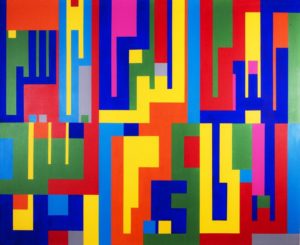
Rasheed Araeen: A Retrospective
02.12.2017 – 25.03.2018, Van Abbemuseum, Eindhoven, The Netherlands.
In the Midst of darkness, 2012.
About:
On the 2nd of December 2017 the Van Abbemuseum opens Rasheed Araeen: A Retrospective, the first comprehensive survey of the artist. The exhibition, spanning 60 years of work, presents a body of work that has had a profound influence on generations of artists, writers and thinkers. The exhibition is structured across five chapters: from his early experiments in painting in Karachi in the 1950s and early 60s, his pioneering minimalist sculptures carried out after his arrival in London in 1964, key pieces from the 70s and 80s following Araeen’s political awakening, his nine panel cruciform works from the 80s and 90s and a selection of his new geometric paintings and wall structures. Alongside this, material relating to Araeen’s writing, editorial and curatorial projects will be presented as part of an expanded artistic practice that in its scope and ambition continues to challenge the formal, ideological and political assumptions of Eurocentric modernism.
The opening of Rasheed Araeen: A Retrospective on the 2nd of December will include an iteration of Chakras, first carried out by the artist in 1969, on the water next to the museum. Hoor Al Qasimi, President and Director of Sharjah Art Foundation, will be the guest speaker.
1. In the Beginning (1955 – 64)
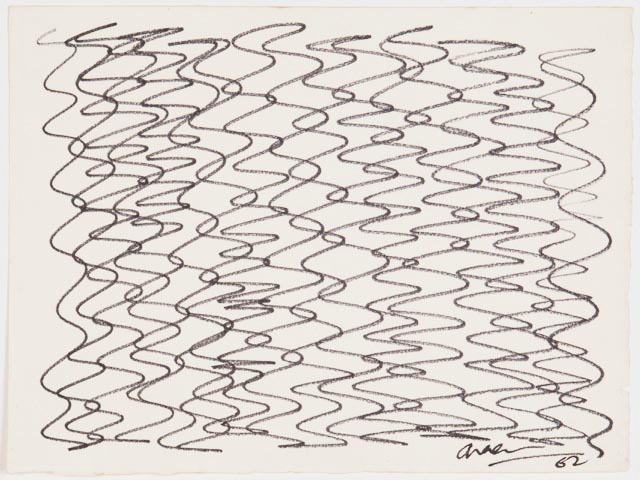
Ubtitled B, 1962.
The exhibition opens with a gallery dedicated to Araeen’s paintings in Karachi in the late 1950s and early 60s. With no formal training as an artist these early works reveal Araeen’s pivotal experiments with abstraction (Boats Towards Abstraction, 1958 – 62 and the Hyderabad series, 1962 – 63), his interest in geometry and natural forces such as water and fire, as well as his initial forays into sculpture with the twisted bicycle wheels of My First Sculpture (1959).
2. Geometry and Symmetry (1964 – 70)
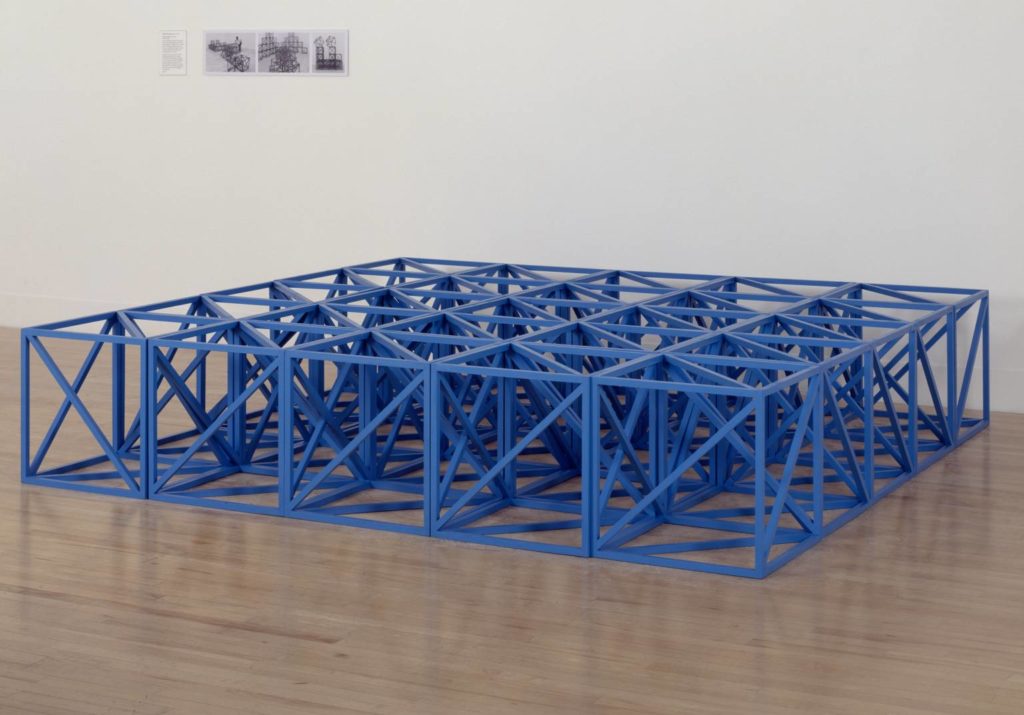
Zero to Infinity, 1968-2007.
The second section of the exhibition examines Araeen’s unprecedented contribution to minimalism. Arriving in Britain in 1964 Araeen embarked on a series of pioneering works, including his Structures and lattice pieces, which drew on his training as an engineer and his interest in geometry and symmetry, which has remained a consistent feature throughout his practice. On display will be, amongst others Sculpture No. 1 and Sculpture No. 3 (both 1965-2017), the lattice works 3 Y + 3B (1968-69) and Bo0 (1969) and the structure Nine (1967), Araeen’s first interactive piece where viewers could re-position the painted wooden cubes in ever-changing configurations. A version of his groundbreaking piece Zero to Infinity (1968-2017) will be on display in the foyer of the museum. Documentation from his performances Chakras (1969) and Triangles (1970) as well as the conceptual project Disco-Sailing (1970-73) will conclude this section.
3. Becoming Political (1971 – 84)
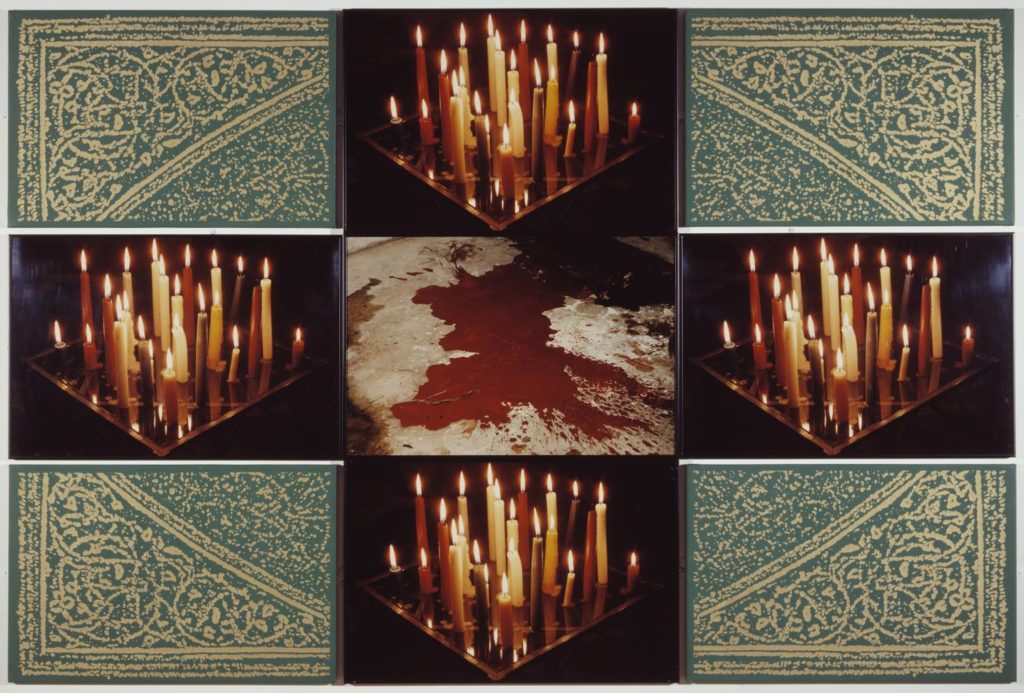
The central galleries reveal a body of work from the 1970s and 80s that confront the politics of Imperial Britain, embodied within the British art establishment from which Araeen remained excluded. Collage, writing, performance and photography deployed in key works such as For Oluwale (1971 – 75), Paki Bastard: Portrait of an Artist as a Black Person (1977) and Preliminary Notes Towards a Black Manifesto (1975 – 77) show an artist increasingly placing himself, his politics, subjectivity and self-representation at the centre of his practice, whilst abiding by the formal rigour that has consistently defined Araeen’s practice. The installation Holes in the Earth (1975), not exhibited since it was originally produced, and Look Mama Macho (1984), not shown since it was exhibited in Magiciens de La Terre (Paris, 1989), will also be on display from this period.
4. In Pursuit of Significant Language (1984 – 97)
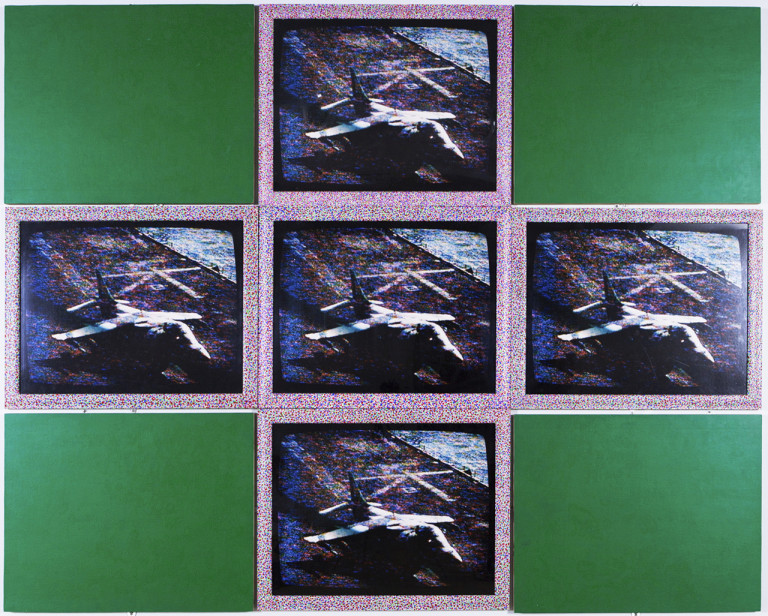
La Grande Jatte, 1991-1994.
The penultimate section includes a series of Araeen’s Cruciform works from the 1980s and 90s. Their piercing nine panels combine green monochromes with photomontage in works such as Green Painting 1 (1985), and White Stallion (1991), referencing high modernist abstraction and contemporary wars in the Gulf and Middle East. This embodies the violent cultural, ideological and military clash between east and imperial west.
5. Homecoming (Recent work)
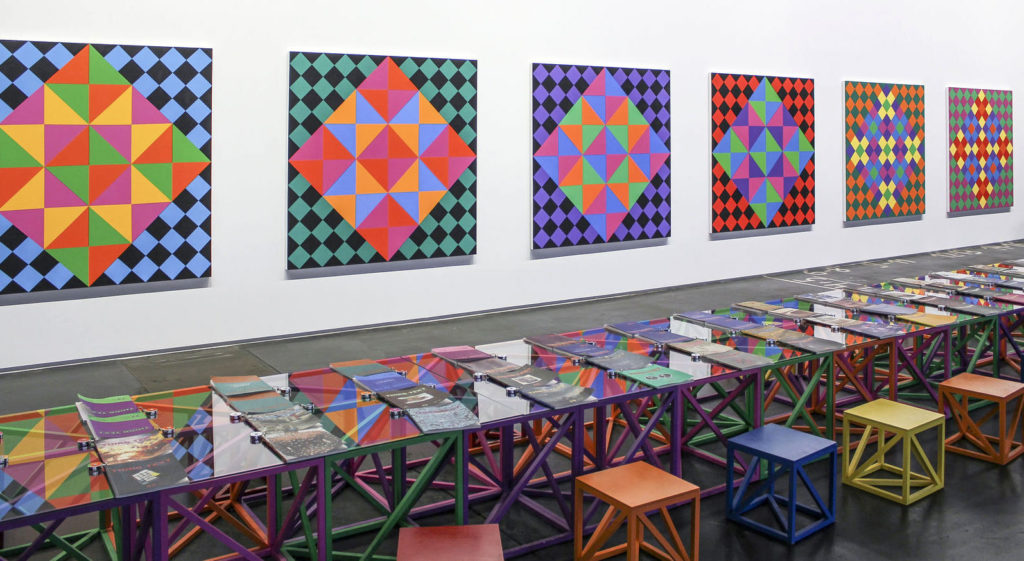
The Reading room, 2016-2017.
The final room of the exhibition includes Araeen’s installation The Reading Room (2014-17), comprised of copies of the journal Third Text that he founded and edited from 1987-2012, displayed for visitors to read on top of his lattice structures. Surrounding this is a series of geometric paintings from his recent Opus Series (2014-ongoing) and two new lattice reliefs.
